Internet Addiction and Sleep Disorders: Causes, Consequences, and Treatment
Table of content
- What is internet addiction?
- Why is internet addiction associated with sleep disorders?
- How does internet addiction affect the quality of sleep?
- How do social media and internet addiction cause sleep problems?
- What are signs that internet addiction is negatively impacting sleep?
- What role do anxiety and stress related to internet use play in sleep disturbances?
- What are the long-term consequences of internet addiction on sleep health?
- Which age groups are most susceptible to internet addiction-related sleep disorders?
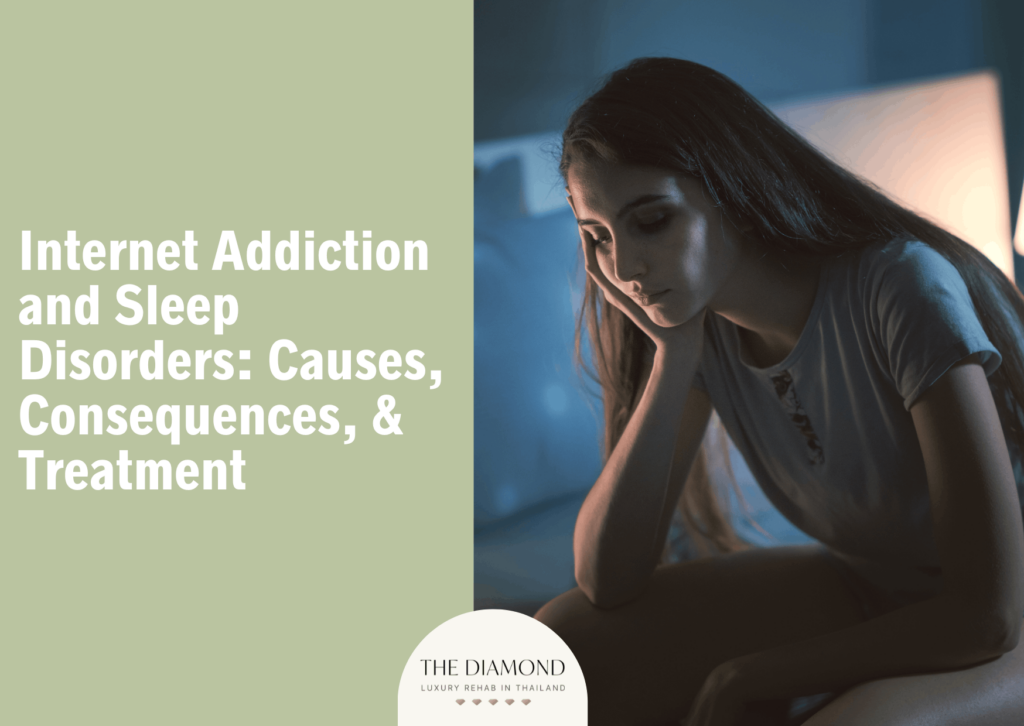
Internet addiction is defined as the compulsive need to use the internet despite the consequences it causes in a person’s life and overall well-being. It is an unhealthy behavior that interferes with and causes stress in day-to-day life, school, or work. Sleep disorders, on the other hand, are problems regarding quality, timing, and amount of sleep, which may result in daytime distress and impaired functioning.
Internet addiction, when occurring in the context of sleep disorders, refers to a situation where excessive and compulsive internet use disrupts a person’s ability to maintain healthy sleep patterns.
Signs that excessive internet use has contributed to sleep problems include waking up often, going to sleep after the usual bedtime, struggling to fall asleep after using the internet, feeling depressed and irritated when unable to use the internet in bed, continuing lying awake browsing the internet even if the partner is asleep, and the need to use the internet to feel satisfied.
Treatment options for internet addiction-induced sleep disorders typically involve inpatient treatment, outpatient treatment, support groups, and cognitive-behavioral therapy.
Finally, the causes behind internet addiction being a predictor of poor sleep quality include fear of missing out (FOMO), exposure to blue light, cognitive arousal, delayed bedtime, high-speed internet, and disturbances during sleep.
What is internet addiction?
Internet addiction is the compulsive need to spend a lot of time using the internet, even when it negatively affects a person’s quality of life. The onset of internet addiction can be in the late 20s or early 30s. Ten years or more may pass between first computer use and the onset of problems, according to M. Shaw and D.W. Black who published their review in the May 2008 issue of CNS Drugs. However, adolescents and young adults are mainly affected since they spend more time online.
The Diagnostic and Statistical Manual of Mental Disorders, Fifth Edition (DSM-5) by the American Psychiatric Association doesn’t recognize internet addiction as a specific form of addiction. Neither does the International Classification of Diseases, 11th Revision (ICD-11) by the World Health Organization (WHO). However, they do recognize internet gaming disorder, which can be considered a step in the right direction toward acknowledging that people can become addicted to the internet.
Internet addiction was introduced as a new disorder in the 1990s. In February 1998, Dr. Kimberly S. Young was the first to describe excessive and problematic internet use as an addictive disorder in her book Caught in the Net: How to Recognize the Signs of Internet Addiction – and a Winning Strategy for Recovery. Dr. Young wrote that internet addiction is real, just like alcoholism and drug addiction or gambling, and it exhibits devastating effects on the lives of addicts and their families.
Becoming addicted to the internet has been an increasing concern in the last couple of years. The fact that access to the internet is becoming widespread further contributes to the issue, along with the fact that devices are more affordable than ever before.
The major aspect of internet addiction is the use of social media. A 2022 article titled, “Teens and social media use: What’s the impact?” from Mayo Clinic reports that an estimated 97% of teens between the age of 13 and 17 in the US use social media. They have an account on one or more platforms. Additionally, 45% of teens within this age range are also constantly on social media. While there are benefits to social media, constantly being on these apps can result in problematic behavior, isolation from real-world friends, and interference with sleep.
According to the 2023 statistics, demographics, & fun facts about TikTok from Omnicore, people spend about 95 minutes on TikTok every day. Amongst global internet users, it’s also estimated that at least 18% between 16 and 64 years of age are on TikTok. This only accounts for a single social media platform, and many of these users also go on Facebook, YouTube, and other networks such as Instagram. The growing use of social media strongly contributes to internet addiction. This can impact sleep-related problems amongst the population.
Internet addiction affects adults too. Internet addiction goes beyond browsing the web. With the rise of online gaming, many people are also showing addictive behaviors toward games that they can play on the internet. It can cause poor quality of sleep.
While this addiction is not recognized with the same medical importance as drug and alcohol abuse, it can wreak havoc on a person’s life. The harm associated with internet addiction falls into two categories – direct and indirect factors.
Direct factors include the potential harm that the use of these devices can cause. Prolonged use of electronic devices can have an impact on health. Additionally, addiction to the internet makes people avoid important activities. Students may prefer to browse the internet or play an online game instead of studying, which can have an impact on their grades. Many people also avoid socializing in real-world situations, prioritizing instant messaging apps and browsing on Facebook to catch up with their friends.
Why is internet addiction associated with sleep disorders?
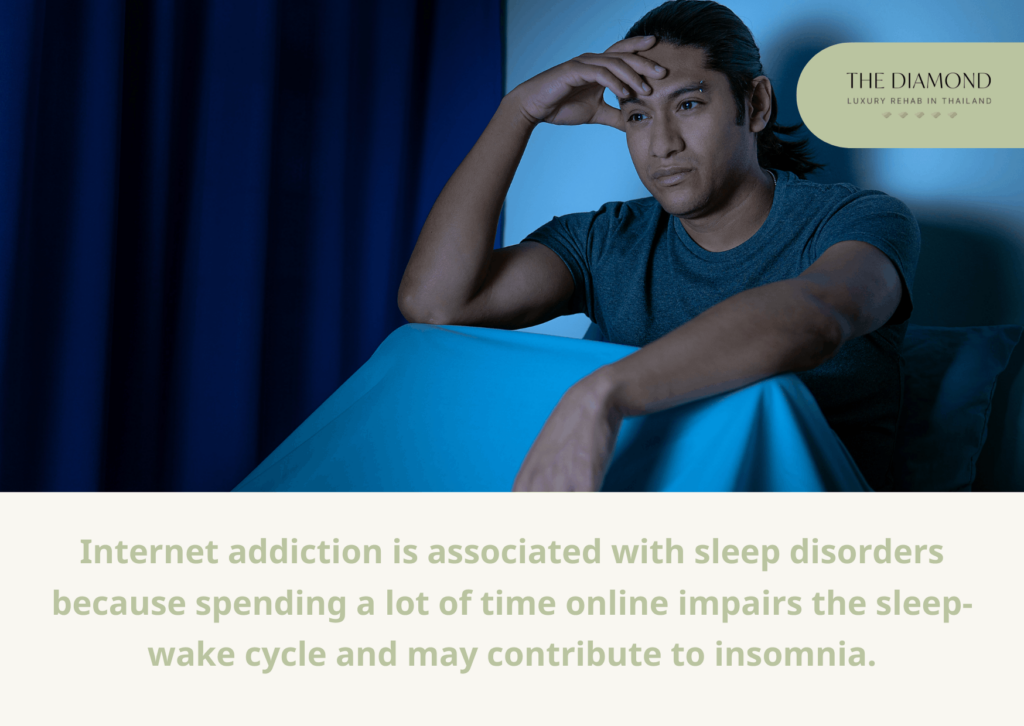
Internet addiction is associated with sleep disorders because spending a lot of time online impairs the sleep-wake cycle and may contribute to insomnia.
According to a May 2023 post on Sleep Foundation, 33% of adults in the United States do not sleep enough every day. Certain states in the country have sleep deficiency percentages closing in on 50%, such as Hawaii, where 43.2% of adults sleep for less than seven hours per night.
In addition to insomnia, internet addiction is associated with sleep disorders because it causes or contributes to problems such as pain, anxiety, and depression. For example, a cross-sectional study that G. Yang et al. published in the September 2019 issue of Frontiers in Psychology showed internet addiction was associated with musculoskeletal pain. This happens because prolonged and excessive internet use takes its toll on posture. Poor postural habits lead to strain on the muscles, tendons, and disks thereby causing pain in the head, neck, elbows, hands, and wrists. At the same time, in the study from the January 2023 issue of Frontiers in Psychology, X. Xie et al. confirmed that internet addiction was strongly associated with anxiety and depression.
The abovementioned studies matter because the consistency of these troubles results in the development of a sleep disorder, which can have a serious impact on a person’s life. In their paper from the January, – March 2022 issue of Sleep Science, R. Cici and G. Yilmazel confirmed that musculoskeletal disorders increase the severity of insomnia.
Internet addiction often starts to become a problem at night. When a person goes to bed, they grab their phone, turn on the TV to stream Netflix, or get out their portable gaming console for one last round of Fortnite. It becomes a habit, and eventually, a person feels like they cannot function properly without routine internet sessions after they get into bed.
While it may not feel like a problem at first, a person may start to need “more” of the internet before they decide to put down their devices and sleep. In the meantime, the use of these devices is cutting into sleep time. Gradually, this can contribute to the development of sleep disorders.
How does internet addiction influence sleep disorders?
Internet addiction influences sleep disorders due to reasons listed below:
- Takes longer to fall asleep: using a smartphone or tablet while lying in bed, or browsing the web, makes it harder for the mind to shut off and relax when a person wants to go to sleep. This means it will take a longer time to fall asleep. The average person falls asleep in about 10 to 20 minutes, a 2020 article titled, “How Long Does It Typically Take to Fall Asleep?” from Healthline reported. When the mind struggles to wind down, it can take much longer to fall asleep. Here, it is important to mention that an article on sleep science and sleep disorders from the National Institutes of Health estimates that up to 70 million people in America have a type of sleep disorder. When a person has a sleep disorder, forming an addiction to the internet can further aggravate the problem.
- Blue light exposure: exposure to blue light prior to sleep affects the release of melatonin. This hormone plays an important role in sleep. This is yet another way in which internet addiction can further contribute to sleep disorders and the symptoms that people experience.
- Lower quality of sleep: internet addiction impairs the quality of sleep. In a study from the August 2020 issue of BMC Pediatrics, M. Tokiya et al. investigated the impact of internet addiction on adolescents and their sleep patterns and found that the more time spent on the internet, regardless of purpose, the higher the rate of sleep disturbances was among those who responded to the questionnaire. Researchers found that internet addiction negatively affects the quality of sleep, and causes sleep disturbances, but also confirmed the relationship between these problems is complex. Sleep problems can contribute to internet addiction i.e. both conditions can contribute to one another.
How does internet addiction affect the quality of sleep?
Internet addiction affects the quality of sleep through mechanisms that are listed below.
- Difficulty relaxing: transitioning from a smartphone or tablet to bed makes it difficult for the mind to switch off or relax. As a result, a person struggles to fall or stay asleep. Excessive use of the internet during the day or night causes a state of almost permanent arousal and inhibits the calming effects of relaxation that are necessary for preparing the body for good sleep, according to a paper “Digital Addiction and Sleep” from the June 2022 issue of the International Journal of Environmental Research and Public Health.
- Interrupted sleep: internet addiction can affect the quality of sleep through an interrupted sleep cycle during the night. Even if a person gets seven or nine hours of sleep, the quality is still poor to produce much-needed positive effects. There are different stages of sleep, and the body relies on each of them to consolidate memories, rejuvenate, and prepare for the day ahead. It starts with light sleep followed by a deep sleep. There is also a stage known as rapid eye movement, more commonly referred to as REM sleep. Once a person goes through each of these stages, the fourth stage is a point where they restart the entire cycle. A person experiences multiple cycles of these stages when asleep, as each cycle tends to last between 90 minutes and 110 minutes. Each of the stages can last between five and 15 minutes. Some stages, such as rapid eye movement, are shorter than the other, but still play an incredibly important role in the sleep process.
- Impaired melatonin: melatonin levels tend to be lower during exposure to the screens prior to sleep. That means that the hormone may not do a proper job of maintaining high-quality sleep throughout the night. Not only does internet addiction delay sleep latency, but also causes lower-quality sleep.
Does excessive internet usage during bedtime affect the ability to fall asleep?
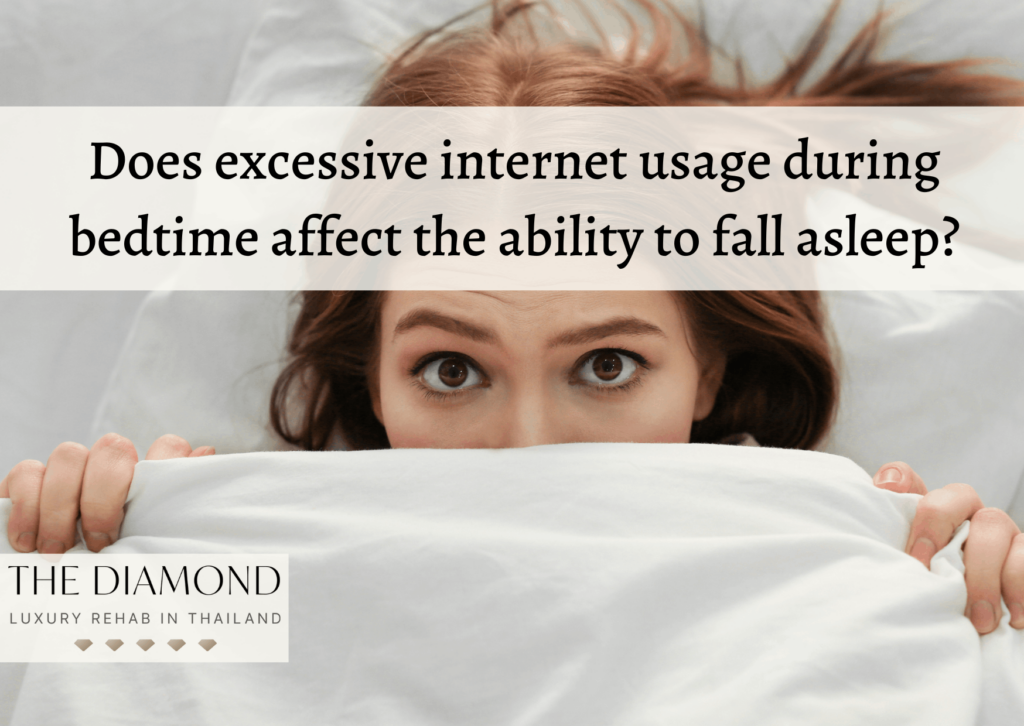
Yes, excessive internet usage during bedtime affects the ability to fall asleep. Exposure to the screens of these electronic devices can stimulate a person’s mind. This makes it difficult to fall asleep. In order to transition from being awake to sleeping, the mind needs to relax – and this process takes longer after exposure to electronics.
In a study that Saad Mohammed AlShareef published in the April-June 2022 issue of Sleep Science, smartphone and tablet use was associated with a 1.5 to 2-fold increased risk of prolonged sleep latency (>30 minutes). The use of these “active” devices had a negative impact on the quality of sleep and affected a person’s ability to fall asleep. The active device is a device that requires a person to perform a specific action e.g. scrolling on a phone or engaging with content.
P.H. Lin et al. published a study in the June 2019 issue of Frontiers in Neuroscience, which confirmed that internet addiction was associated with sleep latency. The term sleep latency refers to the time it takes a person to fall asleep after turning the lights out. In addition to increased sleep latency, internet addiction was also linked to other problems such as decreased sleep quality, sleep duration, and sleep disturbance. Internet addiction was also associated with the use of sleep medication and daytime dysfunction.
Can internet addiction result in sleep deprivation?
Yes, internet addiction can result in sleep deprivation. In the study from the January 2018 issue of PLoS One, S.Y. Kim et al. explained that excessive internet use is associated with physical sleep deprivation. At the same time, sleep deprivation can also trigger internet overuse. These findings suggest that internet addiction and sleep deprivation have a bidirectional relationship.
Internet addiction contributes to sleep deprivation through several mechanisms. As mentioned above in the article, internet addiction and late-night usage of electronic devices make it harder to fall asleep. Perhaps a person decides to read for an hour before sleep or scroll social media. Assuming they decided to use a phone or an e-reader or a tablet, once they put it down, they’ve already been exposed to the blue light. Blue light makes the mind more alert. When that happens, it takes longer than that 10 to 20 minutes to fall asleep. That means the time spent transitioning to a sleeping state is going to take away from the overall sleep duration.
As internet addiction grows, an affected person spends more time on the internet and their electronic devices at night. This is another way in which this type of addiction can interfere with sleep time.
How do social media and internet addiction cause sleep problems?
Social media and internet addiction cause sleep problems due to factors that are listed below.
- Fear of missing out (FOMO): an emotional response to the situations when a person is unable to use the internet or social media thinking they are going to miss out on important posts or developments. FOMO is one of the driving factors of internet addiction and social media use. As FOMO increases so does internet addiction, according to a paper that Y.A. Anastasya et al. published in the June 2022 issue of the International Journal of Islamic Educational Psychology. People with greater fear of missing out are more likely to monitor social media within 15 minutes of attempting to sleep, as reported by a 2022 article titled, “Sleep and Social Media” from the Sleep Foundation. In their study from the December 2020 issue of Computers in Human Behavior, A. Tandon et al. confirmed that FOMO and social media use has a negative impact on sleep.
- Exposure to blue light: internet addiction and social media involve a great deal of blue light exposure, which negatively affects melatonin levels and disrupts sleep.
- Cognitive arousal: internet addiction and social media act as a type of cognitive stimulation that signals the brain and body to remain active and keep engaged. As a result, sleep quality and duration are strongly disrupted. Social media or the internet may influence cognitive processes through several mechanisms such as the multifaceted stream of incoming information encouraging users to engage in attention-switching and multitasking rather than sustained focus, according to a paper that J. Firth et al. published in the June 2019 issue of World Psychiatry.
- Delayed bedtime: people with internet addiction who constantly use social media keep delaying their bedtime, which negatively affects the sleep cycle and makes it difficult to get enough sleep. In these situations, a person experiences problems such as a shorter duration of sleep or difficulty falling asleep. Excessive internet use was strongly associated with delayed sleep onset and bad quality of sleep, reported I. Kokka et al. in their systematic review from the January 2021 issue of the International Journal of Environmental Research and Public Health.
- Disturbances during sleep: even when a person with internet addiction falls asleep, their sleep is often disrupted by notifications from social media accounts. Instead of waiting until the next morning to check them, a person with problematic internet use decides to do it immediately, which further impairs their sleep.
- High-speed internet: The availability of high-speed internet disrupts sleep, a 2018 article by Luke Dormehl from Digital Trends reported. That happens because high-speed internet further contributes to social media addiction and phone use. Easy and quick access to social media contributes to internet addiction and worsens its effects, including the impact on sleep. High-speed internet costs the average person an additional 25 minutes of sleep time every night.
How does the blue light emitted by screens affect your sleep?
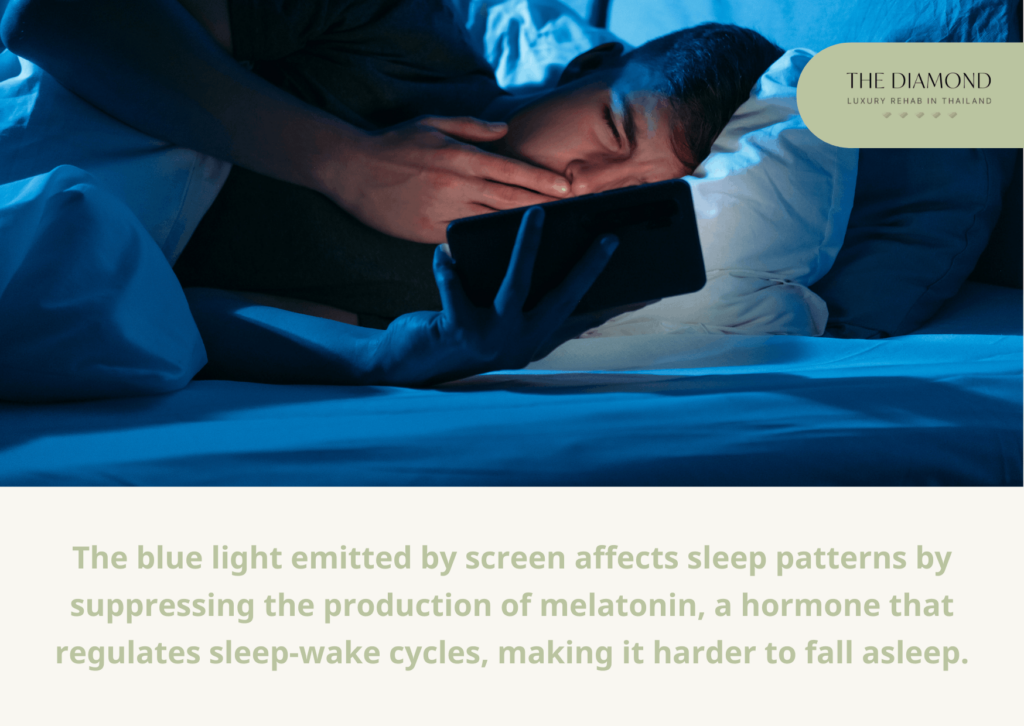
The blue light emitted by screen affects sleep patterns by suppressing the production of melatonin, a hormone that regulates sleep-wake cycles, making it harder to fall asleep.
Melatonin is an important factor in the relationship between blue light and sleep. It is referred to as the sleep hormone and it plays a role in regulating the body’s internal clock, also known as the circadian rhythm.
The circadian rhythm refers to shifts in mental and physical elements that follow a 24-hour cycle. As the day is coming to an end, melatonin releases, which stimulates a shift in the circadian rhythm. That’s when a person feels tired and sleepy. In the morning, the circadian rhythm causes a new shift. This helps people feel alert when they get up in the morning.
Exposure to blue light at night serves as a form of melatonin suppressant. This means that the blue light emitted by the smartphone, gaming console, TV, or tablet can reduce the amount of melatonin that is secreted.
The negative influence of blue light on melatonin suppression was confirmed in that study that A.M. Chang et al. published in the September 2014 issue of The Proceedings of the National Academy of Sciences of the United States of America (PNAS).
The study noted that an estimated 90% of people in the US use an electric device within the last hour before they go to bed. The data was based on surveys conducted among a group of 1,508 adults in the country. There are different types of electronics that these individuals use, but the majority of them emit blue light.
The study showed that participants experienced a disruption in their sleep due to exposure to blue light within a four-hour window before bedtime. This was attributed to the suppression of melatonin in their bodies, along with the fact that blue light is known to promote alertness. The combination of the two factors makes it harder for the participants to fall asleep and can affect their overall sleep quality.
On nights when the participants were asked to read a physical book in the same light setting as with the electronic devices, sleep latency was significantly improved. The researchers explain that this can be attributed to the lack of blue light in these particular cases.
Are there any studies linking internet addiction to insomnia?
Yes, there are studies that link internet addiction to insomnia, and a cross-section study that F. Younes et al. published in the September 2016 issue of PLoS One is a good example. For the purpose of the study, researchers decided to compare the effects of internet addiction to factors that consisted of insomnia, depression, stress, and anxiety. They also focused on determining how internet addiction might affect self-esteem. The study participants were all university students.
Researchers designed a survey with multiple questions. The survey was sent out to 600 students. Once the survey answers were analyzed, the researchers concluded that 16.8% of subjects had potentially developed an internet addiction. Scores for insomnia were highest among students with internet addiction.
The researchers were able to show that there is a strong link between internet addiction and insomnia. Apart from this, they also provided evidence that internet addiction has a negative impact on self-esteem while raising the incidence of depression and anxiety disorders.
A meta-analysis, published in the October 2019 issue of Sleep Medicine Reviews by Z. Alimoradi et al, confirmed that people with internet addiction had a significant reduction in their sleep duration.
In their preliminary study from the July 2021 issue of Sleep Vigilance, S.Y. Meitei et al. found that the prevalence of subthreshold (mild) insomnia was 12.13% and insomnia 31.97% in a sample of 585 subjects. The study showed that internet addiction correlated with insomnia because staying online more than intended contributes to sleep deprivation.
A. Jain et al. published a study in the March 2020 issue of the Journal of Family Medicine and Primary Care where they confirmed that internet addiction was primarily associated with depression and insomnia.
One of the most recent pieces of evidence on this subject came from a study that M. Evli et al. published in the March 2023 issue of the International Journal of Social Psychiatry, which showed that internet addiction was strongly associated with and even predicted insomnia and a tendency to violence.
What are signs that internet addiction is negatively impacting sleep?
Signs that internet addiction is negatively impacting sleep are listed below.
- Waking up often: in addition to struggling to fall asleep, people with internet addiction tend to wake up frequently during the night. The problem becomes worse when they go online after waking up because it takes longer to fall asleep again.
- Going to sleep after the usual bedtime – putting the device down later as time goes by. A person with set bedtime may notice they stay later than that due to internet addiction and social media use. They may purposely decide to go to sleep after the usual bedtime, or they forget about the time and don’t even realize it’s too late. This shortens the duration of sleep and contributes to daytime fatigue.
- Struggling to fall asleep after using the internet: happens because a person constantly thinks about an article they just read, a game they played, perhaps a show they watched, or posts they saw on social media.
- Feeling depressed and irritated when unable to use a phone or another device with internet access when in bed: internet addiction negatively affects a person’s behavior, which is why they may feel irritated or even depressed if they are in a situation where they can’t go online when in bed or if their spouse or a family bring it up.
- Continuing to lie awake browsing the internet after a partner falls asleep: a person with internet addiction jeopardizes their sleep and overall well-being by continuing to stay up late online even when their partner goes to bed and falls asleep.
- Having the need to use the internet as a way to feel satisfied: to people with this addiction, the internet serves as an escape from negative emotions. They may have the strong urge to go online to feel satisfied or relieve negative emotions, even when it makes them stay up light and thereby negatively affects the quality and duration of sleep.
What role do anxiety and stress related to internet use play in sleep disturbances?
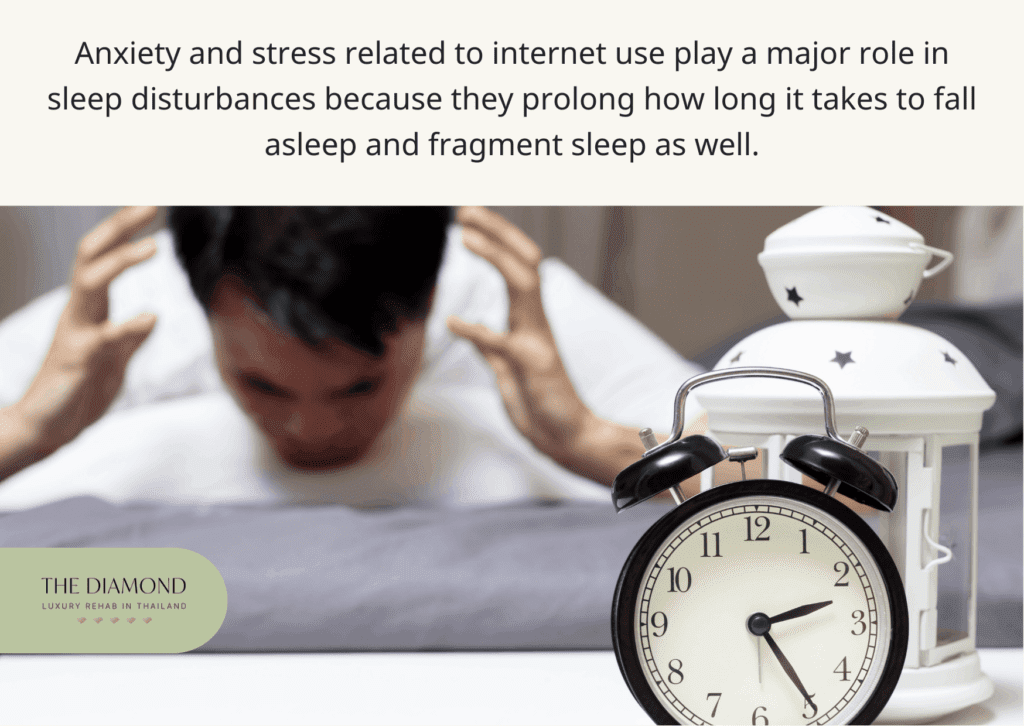
Anxiety and stress related to internet use play a major role in sleep disturbances because they prolong how long it takes to fall asleep and fragment sleep as well. Sleep disturbances such as lack of sleep increase stress levels by increasing the concentration of the hormone cortisol. Higher cortisol further disrupts sleep, according to a May 2019 post on the website of Baylor College of Medicine. Both animal and human studies have confirmed that acute and chronic stress levels exhibit major effects on sleep. These effects are mediated through the activation of the hypothalamic-pituitary-adrenal (HPA) axis and the sympathetic system, according to a paper by Luc Staner in the September 2003 issue of Dialogues in Clinical Neuroscience.
Many people who are struggling with internet addiction and sleep disturbances show signs of anxiety, as well as high-stress levels. Anxiety, which is also associated with internet addiction, further affects sleep because it increases sleep reactivity meaning a person is more likely to experience sleeping problems when feeling stressed out. When a person is unable to fall asleep due to their constant internet use, they become frustrated. Distress about falling asleep also contributes to anxiety, which reinforces the negative emotions that a person is experiencing. A 2023 article on anxiety and sleep from the Sleep Foundation reports that anxiety disorder can negatively affect REM sleep and provoke nightmares or disturbing dreams that increase the likelihood of sleep disruptions.
Stress and anxiety have a bidirectional relationship with sleep disruptions. Not only can stress and anxiety contribute to sleep problems, but lack of quality sleep can make a person more susceptible to symptoms of stress and anxiety. Sleep problems worsen these mental difficulties in people who already have them.
What are the long-term consequences of internet addiction on sleep health?
The long-term consequences of internet addiction on sleep health are listed below.
- Daytime fatigue: when a person doesn’t get enough sleep at night, they feel tired the next day. This can lead to persistent fatigue, due to lack of physical activity.
- Weight gain: sleep deficiency is linked to an increased appetite and poor dietary choices, according to a paper that E. Papatriantafyllou et al. published in the April 2022 issue of Nutrients. People are more likely to make unhealthy choices when it comes to food when they are sleep deprived. This adds more calories, saturated fats, and other elements to the diet, which can contribute to weight gain. This is why there is a connection between sleep deficiency and obesity. Due to lack of physical activity, people with internet addiction are also prone to weight gain. Excess weight can increase the risk of sleep problems.
- Diabetes: people with internet addiction tend to eat an unhealthy diet and have a sedentary lifestyle. With time, these unhealthy lifestyle choices can increase the risk of diabetes. Diabetes increases the likelihood of sleep problems by contributing to sleep disruptions, as per a paper that S. Surani et al. published in the June 2015 issue of the World Journal of Diabetes. It is important to mention here that lack of sleep can contribute to diabetes too.
- High blood pressure: internet addiction can cause major health problems such as hypertension or high blood pressure. However, high blood pressure can make sleep more difficult. At the same time, sleep problems can contribute to hypertension. When left unresolved, hypertension can increase the risk of a stroke or heart attack.
- Weak immune system: internet addiction can weaken the immune system through increased levels of the hormone cortisol, Business Standard reported in August 2015. Weak immunity puts a person at a higher risk of illnesses, which can also affect their sleep quality. It is also important to mention here that sleep disruptions contribute to weak immunity; their relationship is a two-way street.
- Mental health problems: internet addiction is associated with worsening mental health and may contribute to depression and anxiety, all of which negatively affect sleep quality.
- Relationship problems: due to the negative impact on relationships, internet addiction can impair sleep. Relationship problems can keep a person awake and stressed out, especially when arguments and disagreements become constant.
Does internet addiction lead to irregular sleep-wake schedules?
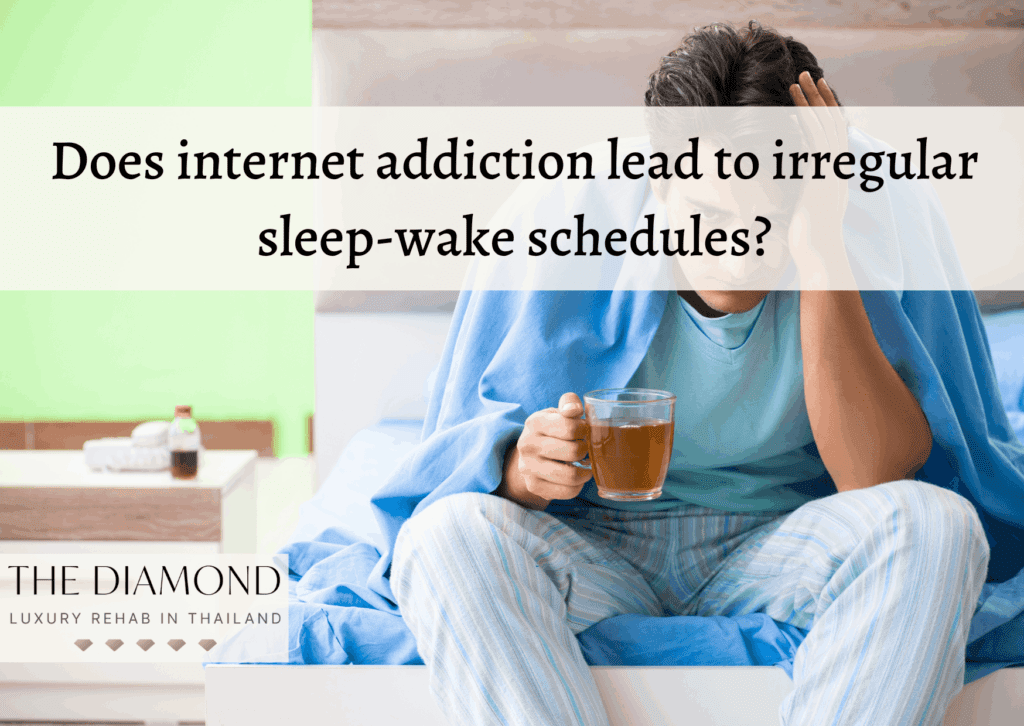
Yes, internet addiction can lead to irregular sleep-wake schedules. A person with internet addiction dedicates their time to online activities. They prioritize the online world over real life, which is why their chores, responsibilities, and even basic needs fall into second place. As they spend more time online, they start going to bed late and don’t get enough sleep. To compensate for this issue, a person may be tired during the day or take longer naps or sleep late in the morning, which can further affect their sleep-wake schedule.
When it comes to improving sleep, one of the most important recommendations that a person can follow is to create a nighttime routine. This also includes going to bed at the same time every night and waking up at the same time every morning.
Which age groups are most susceptible to internet addiction-related sleep disorders?
Teenagers and young adults are most susceptible to internet addiction-related sleep disorders i.e. people whose age ranges from 13 to mid 20s. Tokiya et al., wrote in their paper from the August 2020 issue of BMC Pediatrics that internet addiction and sleep disturbance were found to be significantly correlated independently among Japanese teenagers between the ages of 15 and 16.
However, it is important to keep in mind that everyone (regardless of age group) can develop internet addiction and the problems associated with it. Other studies also have conflicting findings.
For instance, results from a 2023 research article on internet addiction and sleep disorder among medical students published in The Scientific World Journal found that there was no significant age or gender difference in relation to sleep quality and internet addiction.
The research also discovered a 14.4% prevalence of poor sleep quality, with individuals addicted to the internet having the highest incidence (60%).
Moreover, an article titled, “Technology Addiction Statistics 2023: Facts & Numbers” written by Alexandra Baruffati for Gitnux reported that prevalence of internet addiction in 13-17 age group is 73%, about 71% in 18-24 age group, 59% in 25-34 age group, 54% in 35-44 age group, 40% in 45-54 group, 39% in 55-64 age group, and 44% among people older than 64 years of age.
How can internet addiction with sleep difficulties be treated?
Internet addiction with sleep difficulties can be treated with approaches listed below.
- Inpatient treatment: also called residential treatment, a type of program where patients receive treatment for internet addiction while living in a rehab center. Inpatient treatment helps to treat internet addiction with sleep difficulties because addressing the main problem (internet addiction) helps improve sleep and it works by eliminating triggers and distractions that would delay the recovery process. The cornerstone of inpatient treatment is psychotherapy, especially cognitive-behavioral therapy (CBT). Therapy helps by encouraging a patient to understand their emotions and identify negative or irrational thinking patterns. Irrational thinking leads to negative emotions and behaviors. As a person understands how they think and feel, they can also gain more understanding of their behaviors and correct them. Correcting problematic internet use and overcoming addiction helps manage consequences associated with this behavior and thereby improves sleep. Inpatient treatment programs also include benefits such as learning skills for coping and recovery, getting peer support, and professional help or support at all times. The effectiveness of residential treatment programs in the treatment of substance use disorders has been confirmed by scientific research, and a good example is a study by D. de Andrade et al. in the August 2019 issue of Drug and Alcohol Dependence. This means the inpatient treatment approach could be effective for behavioral addictions such as internet addiction. The duration of inpatient treatment is 30, 60, or 90 days depending on the severity of internet addiction.
- Outpatient treatment: a type of program that provides treatment but in a less strict environment; patients keep living at their home or maintain employment/go to school. The outpatient programs also rely on therapy sessions. They are most suitable for people with mild to moderate addiction but can be helpful for patients who have completed an inpatient program as well. The outpatient program helps to treat internet addiction with sleep difficulties because patients receive support and learn to overcome their problems by facing real-life challenges every day. This program gives people more freedom. Outpatient treatment is effective for people with internet addiction. A case report by D.L. King et al. in the November 2012 issue of the Journal of Clinical Psychology confirmed that outpatient treatment consisting of CBT helped a patient with pathological internet use. The duration of the outpatient program depends on the specific needs of each patient but may last up to 12 weeks.
- Support groups: the gathering of people with the same problem, in this case, internet addiction. Support groups help to treat internet addiction with sleep difficulties because people can share their stories and get inspired by the experiences of fellow members. These groups are all about receiving and offering support. As a person gets peer help in the treatment of internet addiction, they also improve sleep patterns. Social support is important for overcoming internet addiction, and lack of it can further contribute to this problem, according to a study that X. Lu et al. published in the January 2023 issue of Frontiers in Psychology. This confirms the effectiveness and importance of support groups and social support in general for the treatment of internet addiction. There is no specific duration of this approach; people can attend meetings as long as they need or want.
What are the most effective treatment approaches for internet addiction with sleep difficulties?
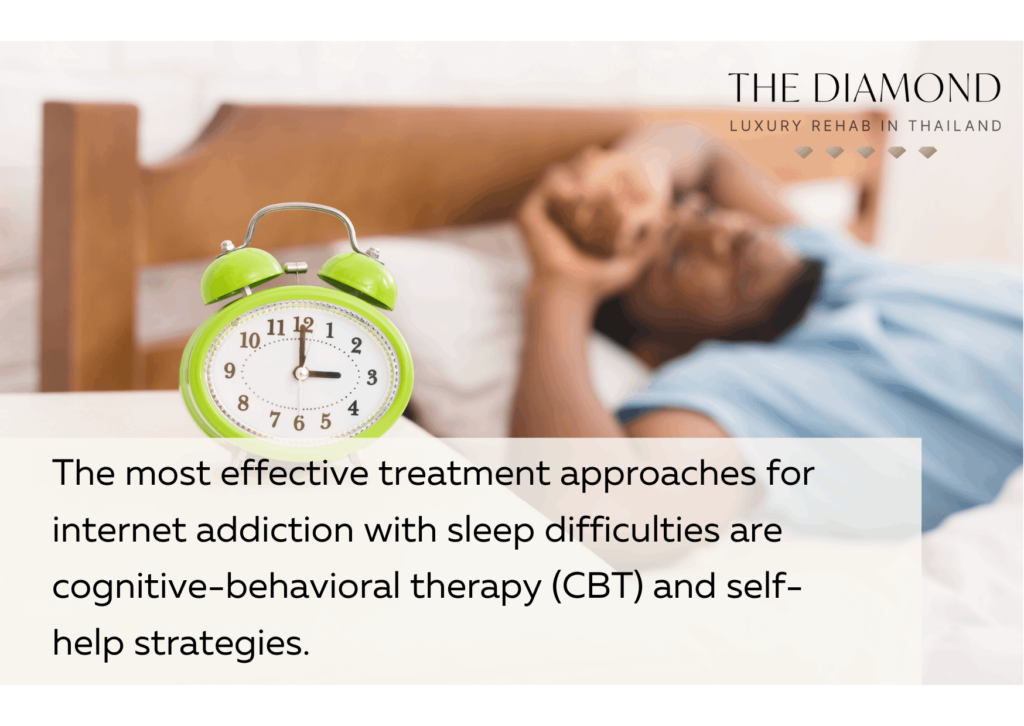
The most effective treatment approaches for internet addiction with sleep difficulties are cognitive-behavioral therapy (CBT) and self-help strategies, in addition to well-structured approaches offered by inpatient or outpatient programs.
Cognitive-behavioral therapy is particularly important because it aids the management of underlying mental illnesses or stress and anxiety caused by internet addiction, all of which can impair sleep.
This type of therapy is highly effective at “rewiring” the way people think about things that they are addicted to. In a paper from the February 2018 issue of the Indian Journal of Psychiatry, Paulomi M. Sudhir confirmed that CBT can help with addictive behaviors. In the treatment of addiction, CBT may involve approaches such as skills training, enhancing motivation, and relapse prevention.
More precisely, CBT can help to equip a person with vital skills that give them more control over their behaviors and the urge to use the internet. With regular sessions and the therapist’s help, people can reduce their nighttime internet usage, which can ensure they sleep for a full seven to nine hours.
When it comes to effective approaches in the treatment of internet addiction with sleep difficulties, it is important to mention practices such as disrupting a patient’s internet use schedules and patterns they have established, usage of external stoppers, or real-life events that take away focus from the internet, and goal-setting regarding the time spent online.
The paper by H. Cash et al. in the November 2012 issue of Current Psychiatry Reviews also names other approaches that aid in the treatment of internet addiction, including abstinence from a specific application, using reminder cards to reduce internet time, and engaging in family therapy and support groups.
People can also talk to their loved ones about their problems. Getting them involved and gaining support from friends and family is another method to ensure they are held accountable.
It is important to note any complications that an individual has developed through sleep deprivation and internet addiction. For example, if the affected person develops depression, then they should consider seeing a therapist. In more serious cases, an individual may need to undergo treatment for the complications they are experiencing.
Developing addictive behaviors toward the internet does not mean a person should never access online services and websites. The internet can still be a helpful element in life, but a person needs to have a greater level of control over their habits and behavior.
One can also set aside some time every evening to spend on the internet, while making sure it’s not too close to bedtime. It’s helpful to give the mind at least an hour to shut off from the internet before getting into bed.
At first, it’s going to be difficult, but someone who has problems with internet use may consider starting with an alarm that tells them it’s time to put the phone down – and then stay in tune with this plan.
Finding things that can replace the need for internet usage at night is also helpful. This may include reading a physical book or doing some meditation before going to bed. These activities won’t expose a person to blue light, and they can help the mind relax and get ready for sleep.

